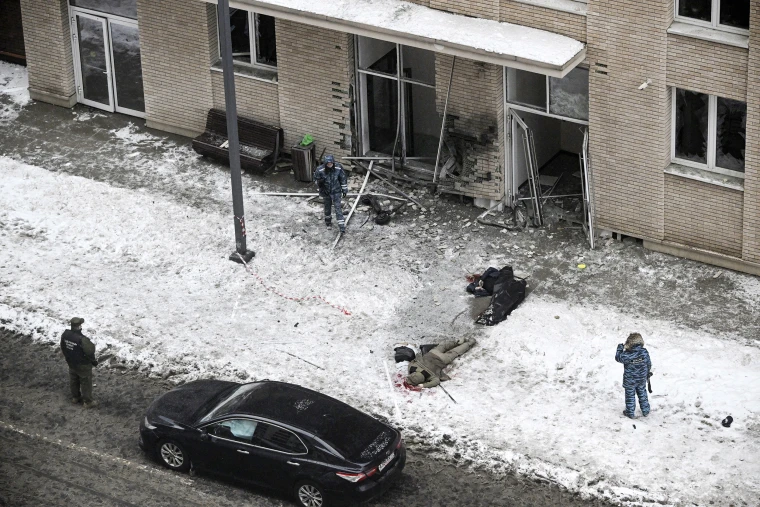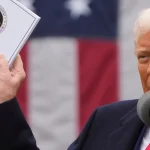
Inside the Shadows: The Strange Assassination of Putin’s Mariupol Commander
Zaur Gurtsiev, a high-profile Russian commander famed for his brutal role in Mariupol, is assassinated in a Stavropol blast—shaking Russia’s war leadership. Speculation swirls around motives, from honey traps to Ukrainian special ops, while Putin’s grip on power grows more desperate. The event deepens fears of internal collapse and signals that nowhere in Russia is truly safe anymore.
A look into the assassination of Russian commander Zaur Gurtsiev, infamous for his role in the Mariupol bombing, unravels a web of war strategy, shifting alliances, and inventive threats. As Ukraine and Russia wrangle in both battlefields and backrooms, what does this brazen killing in Stavropol reveal about Putin’s war, the persistence of Ukrainian resistance, and the prospects for peace?
Cracking open a morning headline about a high-profile explosion is a strange way to start the day—but here we are. I remember a time a pal misdialed me at 3AM, stammering about a ‘commander wiped out in Stavropol.’ We both chalked it up to a bad movie plot. Yet today, it’s no fiction: Zaur Gurtsiev, the commander hailed (or damned) for his part in Mariupol, meets his end deep inside Russia. Not just an isolated hit, but a ripple in the pond—so let’s follow those waves.
The Assassination – More Than Just a Boom in Stavropol
The Russian commander assassination that rocked Stavropol in late May 2025 is already being called one of the most mysterious and consequential killings in the ongoing shadow war between Russia and Ukraine. Zaur Gurtsiev, a Russian military leader decorated for his role in the Mariupol campaign, was killed in a targeted explosion outside a multi-storey residential building in southern Russia. The blast, which also claimed the life of 29-year-old Nikita Penkov—identified as the assassin—has left officials, analysts, and the public grappling with more questions than answers.
Gurtsiev was no ordinary officer. He was, as one observer put it,
“He’s put forth as the face—obviously crucial in Mariupol and now here he is, seems assassinated.”
His presence in official Russian military promotional videos and his public recognition as a hero of the Mariupol siege made him a high-profile target. Research shows Gurtsiev received multiple medals for his actions during the siege, a campaign that left an estimated 8,000 civilians dead and became a symbol of the brutality of the conflict.
The details of the Stavropol explosion have only deepened the intrigue. CCTV footage, now circulating widely on Russian social media, shows Gurtsiev and Penkov meeting briefly between parked cars. The encounter is short. There is no visible altercation. Then, in an instant, a powerful explosion rips through the scene. Both men are killed on the spot, their bodies found with injuries consistent with high-grade explosives.
Local media were quick to label the incident a “suicide detonation,” but the facts are anything but straightforward. Theories have multiplied. Some outlets whisper about a honey trap, suggesting Gurtsiev may have been lured to the site by an online dating encounter gone deadly. Others point to the possibility of remote detonation, with Penkov acting as a courier or unwilling participant. Investigators have yet to confirm whether the blast was self-induced or triggered from afar, but the speculation is rampant.
The assassin identified as Nikita Penkov is a figure who, until now, was virtually unknown. At just 29, his motives and connections remain a mystery. Was he acting alone, or was he part of a larger network? Russian officials have so far remained suspiciously vague on the cause of the explosion. The term “terrorist attack” is being tossed around liberally, but with little concrete evidence made public. What is clear is that both Gurtsiev and Penkov died outside the residential building, and the blast was powerful enough to leave no doubt about its intent.
The Russian commander assassination has sent shockwaves through Stavropol and beyond. Gurtsiev’s death is not just a blow to Russian military morale; it is a signal that even high-ranking, decorated figures are not immune to targeted violence. The fact that the explosion occurred in a relatively quiet southern Russian city, far from the front lines, only adds to the sense of unease. As research indicates, the incident comes amid ongoing tit-for-tat accusations between Kyiv and Moscow, with peace talks stalled and Russia continuing to secure territory in eastern Ukraine.
The investigation is ongoing, but the lack of transparency from Russian authorities has only fueled further rumors. Was this a meticulously planned assassination, a botched attempt at intimidation, or something even more complex? Theories about honey traps and online dating suggest a new, non-traditional path to targeting high-profile military figures—one that relies on psychological manipulation as much as brute force. The use of remote detonation, if confirmed, would mark a significant escalation in the tactics used against Russian military leaders.
For now, the only certainties are the deaths of Zaur Gurtsiev and Nikita Penkov, the devastation of a residential area in Stavropol, and the growing sense that the conflict’s reach is extending ever deeper into Russian territory. As the criminal investigation continues, the world watches for answers—and for what this assassination might signal about the future of the war.
What’s at Stake for Putin? One Reputation, One War, No Exit
As the war in Ukraine grinds on, President Vladimir Putin’s strategy has become unmistakably clear: he is all in. Sources close to the Kremlin and Western intelligence alike agree—Putin has doubled down on his so-called “imperial dream,” transforming Russia’s economy into a full-blown war machine. The stakes are no longer just about territory or influence. For Putin, this war is about projecting strength, preserving his presidency, and securing his legacy as a Russian military leader.
Despite mounting international pressure and even direct intervention from former U.S. President Donald Trump, Putin’s resolve remains unshaken. In a recent two-hour phone call, Trump reportedly tried to persuade Putin to change course. The outcome? No shift in Russian war strategy. Putin’s commitment to the conflict appears absolute, with his personal and political future now tied to the outcome.
Putin’s War Footing: No Room for Retreat
Research shows that Putin has retooled the Russian economy to support a prolonged war effort. Factories have shifted to military production, and resources are being funneled into the conflict at the expense of civilian needs. This shift is not just economic—it’s psychological. Putin has staked his reputation, career, and presidency on prosecuting this war successfully.
“He’s riding a tiger now. He doesn’t quite know how to get off,” one analyst observed. The implication is clear: any sign of weakness or willingness to compromise could be interpreted as failure, both by the Russian elite and the public. The war has become existential for Putin, making peace talks stagnation almost inevitable as he seeks a deal that can be spun as a victory.
The Shadow of Mariupol: A Commander’s Fate and Putin’s Dilemma
The recent assassination of Zaur Gurtsiev, a prominent Putin Mariupol commander, underscores the volatility of the situation. Gurtsiev, recognized for his role in the brutal siege of Mariupol—a campaign that left approximately 8,000 civilians dead—was killed in a suicide explosion in southern Russia. CCTV footage reportedly shows Gurtsiev meeting his assassin, Nikita Penkov, moments before the blast. The attack is being investigated as a possible terrorist act, with speculation swirling about motives and possible links to the ongoing conflict.
This incident highlights the risks faced by Russian military leaders and the lengths to which adversaries will go. It also serves as a grim reminder of the war’s human cost and the bitter legacy of Russian military decision-making in Ukraine.
Peace Talks: Deadlock and Dangerous Options
Peace talks between Russia and Ukraine remain bitterly deadlocked. Both sides accuse each other of intransigence, and the assassination of figures like Gurtsiev only deepens the mistrust. Investigative journalists, some now on Russia’s wanted list, warn that any offer of compromise from Putin could destabilize his power structure. As one expert put it:
“Putin cannot accept a peace deal. That, you know, regardless of what his motivations may be, if he were to do that, he’d expect that there would be a coup.”
The fear of a coup is not unfounded. Studies indicate that a humiliating peace deal could spell career-ending consequences for Putin. Yet, there’s a paradox: while some experts believe a failed war would doom Putin, others suggest that ordinary Russians, weary of endless fighting, might welcome any end to the conflict—so long as it can be portrayed as a win).
Victory—Or the Appearance of It
Putin’s fate now seems tied not just to battlefield outcomes, but to the narrative he can construct around them. As Russian forces continue to capture territory in eastern Ukraine, the Kremlin is desperate for a victory—real or perceived—that can be sold to the Russian public and elite alike. The war’s stagnation, and the assassination of high-profile commanders, only add to the pressure.
In the end, what’s at stake for Putin is not just the future of Ukraine, but his own survival as Russia’s leader. The war has become a test of his ability to maintain control, shape public perception, and outmaneuver both domestic and foreign enemies. For now, there is no exit—only the relentless pursuit of a victory that may prove as elusive as peace itself.
A Tangled Web of Alliances, Tactics, and Blame
The assassination of Zaur Gurtsiev, a Russian commander tied to the brutal Mariupol campaign, is just the latest twist in a conflict that has become as much about shifting alliances and political blame as it is about territory and tactics. As the war grinds on, Ukraine’s persistence on the battlefield and its unpredictable tactics—such as striking deep inside Russian borders—have continually surprised Moscow and the world. These actions underscore a broader reality: the NATO Ukraine conflict is no longer confined to the front lines, but has spilled over into the diplomatic and political arenas, reshaping global alliances and fueling peace talks stagnation.
The shockwaves from Russia’s invasion have been felt far beyond Ukraine’s borders. In a move that would have seemed unthinkable just a few years ago, Finland and Sweden both joined NATO after the invasion, abandoning decades of neutrality. As Finnish President Sauli Niinistö explained, Vladimir Putin’s actions backfired spectacularly:
“He tried to split the European Union. I’ve never seen it more united. He tried to split the transatlantic partnership and especially NATO. And he ended up with neutral Sweden and Finland joining NATO.”
This unprecedented Western unity has left Moscow more isolated than ever, shifting the strategic balance in Europe and beyond. Research shows that the expansion of NATO, once a distant prospect, is now a reality—one that has fundamentally altered the security landscape. The alliance’s new members, sharing long borders with Russia, send a clear message: the West is prepared to stand together in the face of aggression.
Yet, while international alliances have hardened, the prospects for peace remain bleak. The ongoing blame game between Kyiv and Moscow has only deepened the stalemate. Both sides accuse the other of sabotaging negotiations, but neither appears truly ready to compromise. Ukraine, unwilling to lay down arms or cede territory, signals a readiness to continue fighting—even to wage an insurgency—if forced into an unfavorable deal. Meanwhile, Russia, which controls roughly 20% of Ukrainian territory as of 2022, shows little sign of backing down or making meaningful concessions.
Into this volatile mix, U.S. politics have added another layer of drama. Former President Donald Trump’s approach to the conflict has drawn intense scrutiny. During his time in office, Trump made a series of major concessions to Putin—agreeing, in principle, to let Russia keep conquered Ukrainian territory, promising that Ukraine would not join NATO, and ruling out American troops in Ukraine. Despite these gestures, Putin gave nothing in return. As one commentator put it, this was “the most one-sided romance in diplomatic history”. Trump’s continued praise for Putin, even as the Russian leader remains “stone cold sober, calculating his interests, never giving an inch,” has baffled even his closest advisers.
Public comments from Trump and other international leaders have only muddied the waters further, making peace talks stagnation all but inevitable. As research indicates, the war’s front now extends into the political sphere, influencing not just military strategy but the very structure of transatlantic unity. The tit-for-tat accusations over failed peace efforts, coupled with Ukraine’s military resilience and willingness to strike inside Russian territory, suggest that a negotiated settlement remains a distant prospect.
The killing of Gurtsiev—whether a targeted assassination, a terrorist act, or the result of a personal vendetta—serves as a stark reminder of the war’s unpredictable and shadowy dimensions. It is a conflict where alliances are constantly shifting, blame is freely assigned, and the line between military and political tactics grows ever more blurred. As the world watches, the NATO Ukraine conflict continues to reshape international relations, while the question of peace remains unanswered. For now, the tangled web of alliances, tactics, and blame only grows more complex, with no clear end in sight.
TL;DR: Zaur Gurtsiev, notorious for orchestrating the Mariupol siege, was killed in a daring Stavropol explosion. The killing signals evolving Ukrainian tactics, exposes Putin’s strategic quandaries, and hints at unending turbulence in the Russia-Ukraine war.
StavropolExplosion, RussianCommanderAssassination, RussianMilitaryLeader, NATOUkraineConflict, VictimsIdentified, PeaceTalksStagnation, CCTVFootage, SuicideDetonation, MariupolBombingCampaign,Putin commanderassassination, ZaurGurtsievdeath, Stavropolexplosion, Mariupolcommanderkilled, Russianmilitaryleadershipcrisis, Ukrainetargetedkillings, Russian-Ukrainianwar2025, Putinwarstrategy, Russianwarlegacy, NATOUkraineconflict, Mariupolsiegewarcrimes, politicalassassinationRussia, honeytrapassassination Russia
#StavropolExplosion, #RussianCommanderAssassination, #RussianMilitaryLeader, #NATOUkraineConflict, #VictimsIdentified, #PeaceTalksStagnation, #CCTVFootage, #SuicideDetonation, #MariupolBombingCampaign,#PutinAssassination, #StavropolExplosion, #GurtsievDeath, #MariupolCommander, #RussianWarCrimes, #UkraineConflict2025, #ShadowWar, #RussianMilitary, #PutinStrategy, #PeaceTalksStalled

